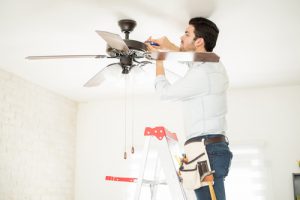
Bipartisan, bicameral legislation introduced by U.S. Sen. Thom Tillis (R-NC) to provide regulatory relief to the nation’s $1.8 billion residential ceiling fan market in order to shield consumers from higher prices has become a federal law.
The Ceiling Fan Energy Conservation Harmonization Act, S. 2030, signed by the president on April 3, modifies the date for when two energy efficiency regulations for ceiling fans take effect. The misaligned regulation enactment dates could have led to supply chain disruptions and tens of millions of dollars in additional compliance costs for labor, labeling and testing of product models, according to the senator’s staff.
“I am glad this bipartisan legislation to streamline the efficiency standards for ceiling fans has been signed into law by President Trump,” said Sen. Tillis. “This common sense, bipartisan law provides regulatory relief that will protect American families from being penalized with higher costs.”
Sen. Tillis introduced S. 2030 on Oct. 30, 2017, with U.S. Sens. Martin Heinrich (D-NM), Cory Gardner (R-CO) and Joe Manchin (D-WV) signing on as cosponsors. S. 2030 is the Senate version of the identical bill, H.R. 3477, introduced by U.S. Reps. Richard Hudson (R-NC) and G.K. Butterfield (D-NC) on July 27, 2017 in the U.S. House of Representatives.
Sen. Heinrich said he was also happy the bipartisan bill became law and noted the additional environmental benefits. “Energy efficiency standards for ceiling fans and other appliances are a proven way to help consumers save money on their utility bills, while also lowering emissions of greenhouse gases and other pollutants,” said the senator. “By modifying compliance with the standards, we can avoid passing along unnecessary costs associated with implementation to American families.”
Originally, a regulation applying to energy efficient light bulbs was scheduled to take effect in 2019, and a regulation applying to energy efficient fan motors was scheduled to take effect in 2020. Under the newly signed law, both regulations now will take effect in 2020.



